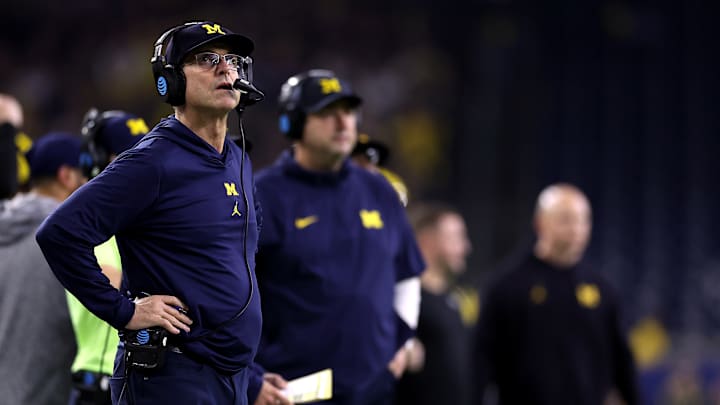The NCAA announced on Tuesday that their investigation into potential recruiting violations pertaining to Michigan head coach Jim Harbaugh has concluded. They found that Harbaugh violated the protocols during a recruiting dead period, additionally, they claimed that Harbaugh did not cooperate with the investigation.
In the press release by the NCAA, they stated, “Harbaugh's violations of the COVID-19 recruiting dead period are Level II violations, but his unethical conduct and failure to cooperate with the membership's infractions process — specifically, his provision of false or misleading information — is a Level I violation.”
The NCAA also released a 48-paged document detailing the investigation and infractions involved with the Michigan football program.
In the document, the NCAA stated how Harbaugh violated the dead period rules:
“The conduct in this case specific to Harbaugh centered on in-person contacts with two football prospects and their fathers in February and March 2021 during the COVID-19 recruiting dead period. Harbaugh also provided one of the prospects and the prospect's father access to the institution's football facility, where members of the football staff then gave the family a tour.”
During a dead period, college coaches and programs are not allowed to have in-person contact or visits with recruits.
Harbaugh evidently denied all the accusations of violating the recruiting dead period rules, and this ultimately led to a Level I violation. Harbaugh made the entire case much worse when he provisioned “false or misleading information” to the public while the investigation was taking place. Solely the recruiting violation would have been a slap on the wrist for Harbaugh, but the denial and reluctance to cooperate with the investigation bumped the penalty up to a one-year suspension.
In January, fresh off winning a National Championship, Harbaugh signed a five-year $80 million contract with the Los Angeles Chargers to become their head coach. Clearly, Harbaugh has no plans to return to college football in the near future, and with the four-year show-cause order, it seems even more unlikely of that happening.
The show-cause order means if Harbaugh returns to a college football program in the next four years, more specifically before Aug. 6th, 2028, it will trigger the one-year suspension. The suspension would include a ban on all football and recruiting activities.
I believe that this is a very reasonable and fair conclusion of the investigation. The NCAA found sufficient evidence of the violations, and Harbaugh's refusal to abide by the investigation protocols made everything even worse, leading to a potential full-season suspension. Michigan did a poor job at covering up the evidence, I am sure other programs have done similar without being caught.
This shouldn’t have any impact on Penn State, as a Harbaugh return to Michigan or college football is as unlikely as ever now. However, there is another investigation that will have an impact on Penn State.
Unrelated to the Harbaugh recruiting violations investigation, the NCAA opened a case last year against Michigan football to investigate sign stealing. The potential ramifications of this scandal could potentially be massive, including a punishment to current head coach Sherrone Moore. The case is still open and ongoing as college football fans await the results of the investigation.
